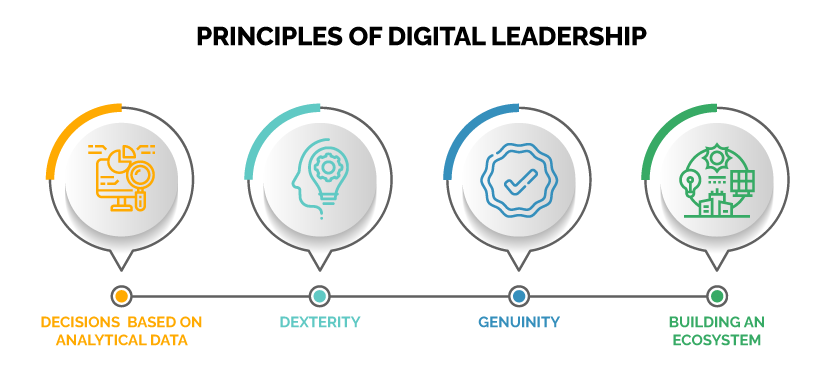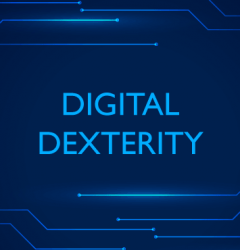
Digital leadership in this era has become a requirement for a business to survive in the fast and ever-changing business environment. Every single market is characterised by this fast pace in today’s day and age. Due to this, it has become increasingly essential to cultivate habits that facilitate ease and accuracy in working.
Digital technology has had a huge impact on the world of business and hence, this new era involves the transformational shift from the traditional age to the digital age in terms of adopted business practices. There are many opportunities associated with the new market and that can be exploited by your business; better experiences can be delivered through this.
87% of executives believe that the digital revolution, coupled with a lack of understanding, has disrupted industries.
Let’s dig deeper!
What is digital leadership?
It is simply using digital assets strategically in the achievement of a business’ objectives.

The reinvention of traditional business methods and doing this regularly to keep up with the changing times is essentially what the concept encompasses. It is definitely easier said than done.
The execution of digital leadership is practically difficult and takes some time to get used to. Standardization and automating platforms are very helpful in such scenarios.
Only 31% of employees concur that their leaders actively foster an inclusive team environment.
How is it different from Traditional Leadership?
1. Digital implications
Investors seek value in their investments. Value is added to businesses by the latest and most usable technologies.
2. Innovation
Digital technologies are rethought versions of traditional ways of working put into a digital medium. Plans for change, strategies, and business models based on innovation is what differentiates it from traditional means.
3. Change
Change is the only constant in this medium and adaptability to the new age on a continuous basis is predominant to become a leader in the digital era. For the digitalization of business, overcoming resistance to change is exceedingly essential. Right from the base of operations to the nitty-gritty’s of business, welcoming change is important.
4. Empowerment
To actualize these changes, every stakeholder involved in the functioning of the business needs to be empowered with all the required digital tools that aid in overcoming challenges and making the most of opportunities. The competency of the business is dependent on this.
Also read: Digital Modernization a Must. Modernize your Enterprise IT today!
Why should you attain Digital Leadership?
There are very many benefits of being a digital leader such as:
1. A new outlook to work
Digitalization will create a new normalized organizational culture with all the relevant tools to make your business a success.
2. Enhanced productivity
Teaching the proper use of digital resources requires a digital leader; otherwise, the resources may not be fully utilized by the employees.
3. Increased return
The cost of operations ultimately reduces with the use of digital tools; with loyal customers and speedy work, the return is bound to increase.
Also Read: Leadership 2.0: How Automation Is Reshaping The Role Of Executives
4. Boost in customer loyalty
Satisfied customers are loyal customers. With speed and better work, customers will remain loyal as they will see no reason to move to a competitor.
Also read: 10 Key Digital Leadership Practices to Follow
What does it take to be a Good Digital Leader?
There are certain traits or skills that a digital leader must have. They are as follows:
1. Ability to network well
A digital leader needs to have brilliant communication and be able to network well and maintain those relationships. This will ensure that the business is updated with all the fast-paced changes that occur.
2. Belief in vision
A good digital leader should have a strong vision and have faith in that vision. The employees will only follow a leader if they strongly believe the cause of their work. This furthers innovation and adds a holistic approach to the strategy.
3. Good understanding of digital tools
Digital leaders MUST be well-versed with digital tools and be able to teach their peers and teams the same ensuring the proper understanding of the technology. Without the skills being imparted, resources are wasted.
Gartner Top Strategic Technology Trends
Some of the tools that could be helpful involve hyper-automation using Robot Process Automation; Low-code No-Code (LCNC), Artificial Intelligence, Blockchain, IoT, etc.
4. Ascertaining which risks to take
Taking risks is very important to further organizations in the challenging business environment; a good digital leader should take calculated risks to evolve the business.
“The biggest risk is not taking any risk”
Mark zuckerberg
5. Willing to change
Being adaptable is a very essential trait in a digital leader. If they are not willing to change, it will be detrimental to the business.
6. Cohesive
A digital leader needs to be collaborative and so as to ensure cohesiveness and smooth work between departments. This will ultimately add value to the organization.
Also Read: From Coding to Strategic Leadership: Quixy Levels Up Your IT Game
7. Creativity
Being curious and creative go a long way with digital leadership; being open to ideas, concepts, and thinking out of the box aid organizations in the achievement of their goals. Inspiration can come from anywhere.

Steps to attain Digital Leadership
The following steps can be followed to gain digital leadership for your organization:
- Rethink and reinvent your business’ current operational framework keeping in mind the changes that need to be incorporated involving digital implications and innovation.
- Identify potential digital leaders who possess the required traits and skills.
- Develop programs to build the capability of the digital leader
- Create a digital ecosystem
“71% of leaders say the workforce is important in supporting their digital transformation strategy” according to Forbes.
Companies can emerge as digital leaders if the business and team leaders within the organizations are able to keep up with the digital technologies that envelope their work. Different softwares would be used by different individuals to facilitate specialized services and many others are universally utilized by everyone; this leads to cohesiveness.
Yes, digitalization of businesses has made a lot of manual labour more organised and systematic but there is always a human being behind the working of a machine at the end. This is where workplace culture comes in. It is of paramount importance for the workplace culture to be in line with the digital competencies.
Also read: 7 Traits of Successful Digital Leaders
The Importance of Workplace Culture in Attaining Digital Leadership
Good workplace culture is significant for the company to further its operations meaningfully and can be achieved if the morale of the employees is high and maintained that way. For this, management must check-in and be genuine and dexterous in their part to boost their motivation and willingness to adapt. You need to consistently empower your employees to make your company ‘a great place to work’.
Since the complexities that affect the business bring in a lot of competitiveness in the marketplace, a workplace culture with a good digital leader is seen to better anticipate the challenges posed by the business environment and therefore make better decisions using analytical and factual data.
There has been a proven directly proportional relationship between digital readiness and improved financial performance in businesses.
Also read: Digital Workplace – All You Need to Know
So, how can a digital leader create an enthusiastic environment for the employees? There are several principles of digital leadership that can be kept in mind.

1. Decisions should be based on Analytical Data
The abundant data in the marketplace and its extensiveness is what drives digital leadership. Decisions based on analysis done in real-time is more significant than traditional decision making based on human’s opinionated competencies.
There is such vast untapped data that businesses tend to overlook which is truly an opportunity forgone. If you invest time, effort, and resources in the analysis of this data, it could lead to the derivation of insights that could be actionable as objective decisions.
2. Dexterity
This is extremely important for your business to grow in the digital age. Agility towards change is exceedingly essential. Resistance to change needs to be combated in order to attain digital leadership; but how do you achieve this?
A lot of organizations are stuck in their past strategies, of the opinion that they worked before and they should work again. This is a hindrance. The application portfolio which is bloated and aligned to the past strategy needs to be modernized; it needs to operate at the pace of the business.
Adaptability to change characterizes a good digital leader. This involves learning as well as re-learning i.e. it becomes crucial to go back to square one with a new perspective.
3. Genuinity
Digital leadership needs to be authentic in order to make an impact on the workplace culture. While emulating great digital leaders in the market is helpful, it is also very important to stay true to your brand and be divergent from the competition.
Digital footprint is everywhere and in order for yours to be meaningful, genuinity goes a long way; this applies not only to the external environment but also to your employees. A strong and unified workplace culture is dependent on the confidence inspired in them by their leader.
4. Building an Ecosystem – Be digital
This principle of building an ecosystem comes with the concept of “being digital” rather than just engaging in digitalization. It needs to be an all-round effort that the workplace becomes habituated to and a regular way of life.
Innovation in application portfolios are essential as they can no more be designed to face past challenges. Application vendors need to cater to this and make their offerings more consumable and modular.
Also Read: Key Leadership Statistics that You Should Not Miss
Consumers require a great deal of innovation inculcated into their lifestyles; employees do too. Personalized application experiences are regarded as regular expectations. To actualize these needs and wants and present them as offerings, digital leaders have to:
- Leverage analytical data
- Derive insights
- Engineer processes
- Attain digitized results.
For this, management needs to be able to respond, ascertain the risks and take decisions.
Ultimately, you cannot do nothing, and you have to constantly stay relevant
“Amateurs sit and wait for inspiration, the rest of us just get up and go to work”
Stephen king
Barriers will arise and business practices will have to be transformed in order to overcome them. Swift, well thought out reactions are important. This is furthered greatly by technological innovation – be it AI, Low-Code No-Code, IoT, Blockchain or RPA.
Therefore, workplace culture makes all the difference in an organisation this digital age. It is more critical than ever before as it creates the crux of an organization’s potential in the face of breakneck competition.
Summary
To sum it up, we discussed what digital leadership is, how it is different from traditional leadership, its benefits and what it takes to be a good digital leader. We took into account its impact on an organization, especially its workplace culture. We also discussed its principles and how crucial a good corporate culture in this digital age.
Quixy, as a leading No-Code Process Automation and Application Development Platform, can aid in facilitating digital leadership and transform the workplace culture due to the ease and simplicity with which complex operations can be automated and streamlined, all for the betterment and development of your business.
At Quixy, we aim to create a solution to the automation of processes so as to aid the transformational journey of businesses toward becoming digital leaders. Using our no-code tools, our goal is to make easy previously more complicated automation techniques. Begin your journey towards streamlined operations and tailored apps – all with the simplicity of our platform. Get started today to harness the potential of automation.
Frequently Asked Questions(FAQs)
Q. Why is workplace culture important in the context of digital leadership?
Workplace culture plays a crucial role in shaping employee behavior, engagement, and productivity. In the digital age, a positive and supportive culture is essential for fostering innovation, collaboration, and adaptability, which are all key attributes of effective digital leadership.
Q. How can digital leaders create a positive workplace culture?
Digital leaders can create a positive workplace culture by promoting open communication, fostering a sense of belonging, encouraging innovation, recognizing and rewarding employees, and prioritizing work-life balance.
Q. How can digital leaders effectively manage remote teams?
Digital leaders can manage remote teams by building trust, establishing clear communication channels, setting expectations, providing support, and fostering a sense of community.
Q. What role does technology play in digital leadership?
Technology plays a crucial role in digital leadership. It empowers leaders to connect, communicate, analyze data, automate processes, and create exceptional customer experiences. By effectively leveraging technology, digital leaders can drive innovation, improve efficiency, and achieve their organization’s goals in the digital age.
Q. How can digital leaders prepare their organizations for future challenges?
Digital leaders can prepare their organizations for future challenges by staying informed about emerging technologies, investing in employee development, fostering a culture of innovation, and building resilience.
Login
Please login to comment
0 Comments
Oldest
















